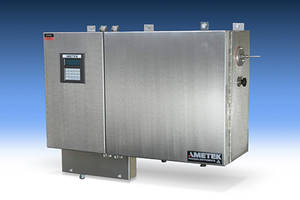Latest 5100 TDLAS Analyzer from Ametek Offers Real-Time Monitoring
Share:
Press Release Summary:

The 5100 Tunable Diode Laser Absorption Spectroscopy Analyzer is used for detecting CO₂. The product uses integrated sample handling system and a reference cell. The unit’s detector element does not physically interact with pipeline gas. The device is suitable for use in gas plants where continuous evaluation of percentage of methane in the product is required. The 5100 analyzer offers a data acquisition rate of two seconds.
Original Press Release:
Tunable Diode Laser Absorption Spectroscopy in the Natural Gas Value Chain
PITTSBURGH, PA -- Near-infrared and infrared tunable diode laser absorption spectroscopy (TDLAS) have garnered much attention for their three key attributes: specificity, high sensitivity, and fast response speed. The specificity is the result of the extremely high spectral resolution it can achieve. The second attribute results from the ability to rapidly tune the lasers, so techniques like wavelength modulation spectroscopy (WMS), can be easily implemented. And, because TDLAS is an optical technique, it offers very fast response speeds. The high specificity, sensitivity, and response speed of TDLAS make it very suitable for a variety of process measurements.
TDLAS is especially well suited for monitoring carbon dioxide (CO₂) levels during natural gas processing and liquefication. Its laser-based CO₂ sensor offers faster response time, large dynamic range and low drift, compared with other techniques such as gas chromatography. CO₂ is a naturally occurring diluent in oil and gas reservoirs that can act with H₂S and H₂O to form corrosive compounds that threaten steel pipelines. Measuring CO₂ concentration is required at processing plants and natural gas custody transfer points to ensure the levels are low enough to meet quality specifications for pipeline transportation. Pipeline levels of CO₂ should be no more than 2%-3%, while well head natural gas can contain as much as 30% CO₂.
There are significant advantages to using TDLAS-based technology for measuring CO₂ in a natural gas stream versus gas chromatography. Those advantages include the speed of the response, and low maintenance requirements. Similarly, TDLAS analysis provides higher accuracy and selectivity than either near infrared or infrared photometry.
CO₂ measurement also is important in maintaining the efficiency and performance of natural gas liquefaction plants. Natural gas entering the plant often contains contaminants that must be reduced to ensure satisfactory plant performance. Several treatment processes are available for the removal of CO₂ from feed gas, each has its advantages and limitations.
Regardless of the process used, process optimization requires measurement of the CO₂ before and after purification of the feedstock. Additionally, the complex process that transforms the natural gas into a liquid involves very-low-temperature operations, which can result in CO₂ freeze out on the exchanger surface, plugging lines and reducing plant efficiency.
AMETEK’s 5100 TDLAS is an extractive-type CO₂ analyzer. No sample conditioning is required. The instrument utilizes a fully integrated sample handling system and a sealed reference cell for continuous on-line analyzer verification. The 5100 also employs digital signal-processing methods that allow for the implementation of multivariate calibration and can accurately measure two separate species with completely overlapped spectral responses. Some measurement combinations relevant in natural gas operations are CO₂ and water, and CO₂ and methane.
Pipelines currently are the most common method for transporting large quantities of natural gas over long distances. There are currently over 1,500,000 miles of dedicated pipelines used to transport natural gas in the United States for transmission and distribution. Minimizing the water content in the pipelines is critical to prevent pipeline corrosion.
If water is present it will react with the CO₂ to from carbonic acid, or H₂S to form sulfuric acid. Both acids can corrode pipe, potentially leading to safety risks, lost product, or environmental pollution incidents. Historically, electrochemical detectors have been used to monitor the water level in the samples. This type of sensor degrades over time as it is exposed to low level organic components.
With AMETEK’s 5100 TDLAS system, the detector element does not physically interact with the pipeline gas and, therefore, there is no change in the system response relative to the sensor contamination.
Landfill gas produced through decomposition of organic material contains 45% to 60% methane and 40% to 60% CO₂. Methane is a potent greenhouse gas with a global warming potential that is 25 times greater than CO₂. Rather than releasing landfill methane into the atmosphere or flaring it, methane can be collected, converted and used as an energy source.
Operators of landfill gas plants need to continuously evaluate the percentage of methane in their product because this determines the end use of the gas and the pricing. A TDLAS analyzer is a good choice for such a task. Traditionally gas chromatography and mass spectrometry are used to provide methane monitoring.
Gas chromatography offers high sensitivity, but it has the disadvantage of a slow response time. Mass spectrometers can quickly measure multiple components but may have a significant total installation cost. A TDLAS analyzer provides real-time monitoring with a data acquisition rate of two seconds and is significantly less expensive than both gas chromatographs or mass spectrometers.
AMETEK Process Instruments—the leader in on-line analytical instrumentation with the industry’s most extensive product line—offers analyzers based upon eleven differentiated technology platforms and used by markets ranging from oil, gas, and power to pharmaceutical manufacture and semiconductor chip manufacturing. For more information on the full line of AMETEK’s analytical instrumentation, contact AMETEK Process Instruments, 150 Freeport Road, Pittsburgh, PA 15238. Phone: 412-828-9040. Fax: 412-826-0399. Web site: www.ametekpi.com.
Contact: Karla Graves, +1-412-826-2446, karla.graves@ametek.com




